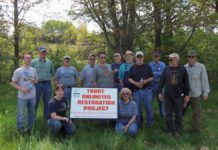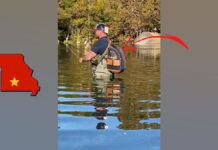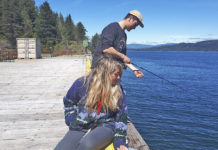GREENOUGH — It’s not always easy for Timothy Sterlachini to leave home. After all, no one is trying to kill him there. The ground is safe, and his head doesn’t have to be on a swivel 24-7. But he’s stuck there in his compound in Virginia.
“I feel like I’m a slave of my property,” he said. “I like it, I’m supplied well, I don’t have to leave, I drive up and down trails and I never have to leave the border. Just a little couple acres. I can walk around naked if I want to. I rarely piss inside.”
When he does leave, he’s endlessly looking, searching, scanning. “Because you’re scared,” the Marine Corps combat veteran said.
Sterlachini’s intense eyes were steady between his shaved-smooth skull and the wiry beard emanating from his chin as he sat beside the Blackfoot River at dusk on Monday. In low, measured speech, he described his struggle to readjust to civilian life after years as a professional warfighter. Now in his 50s, Sterlachini “was the lead track of the second wave going in” to Nasiriyah, Iraq, in late March 2003.
People are also reading…
“Over there, I felt the most peace I’ve ever felt in my life,” he said, his gaze shifting to the darkness creeping onto the shore. “I’ve never felt that peace before and it’s because I had no fear, the fear was gone. And you are dangerous then.”
“It was in the most suckiest, s—iest environment that you can really imagine,” he continued, “and you only had to be focused on direct front,” because friendly combat troops were all around behind. “And you get back (home) and your head’s tired of looking around. And that’s why, I guess, I feel like a slave, you know, in your compound or in your house, in your avoidance.”
When the Battle of Nasiriyah subsided after 11 bloody days, 32 American service members were dead, 60 more were wounded and six had been captured in the critical river city that lay between advancing American forces and the Iraqi capital of Baghdad. Untold scores of troops bore witness to that carnage and more to come in the Global War on Terror that left thousands of Americans dead and countless more physically and psychologically injured or disabled.
Seth Drousche, James Bates and Nicole Elder fish the Blackfoot River near Greenough on Monday morning. Drousche, of the US Navy, and Elder, of the US Army, participated alongside Blackfoot Outfitters guide, Bates, in a multi-day-float and fishing trip on the Blackfoot through Team Semper Fi, an outdoor therapy branch of the Semper Fi Fund.
Nearly two decades later, Sterlachini and at least two others from the Battle of Nasiriyah were part of a group of about 20 veterans casting fly rods into the Blackfoot River near Ninemile Prairie northeast of Missoula, in search of more than just fish. Gathered under a tent for a dinner of steak and wine, the pristine waterway — the near-mythic setting of “A River Runs Through It” — stood in sharp contrast to the sweltering desert heat in which the men and women had fought the United States’ longest war. The military taught them how to wage war. On the river, they were learning to find peace together.
“The military prepares you for war like nobody else,” said Robert Nuttall, a 52-year-old Army veteran who lives outside Houston. “They program you for war like nobody else. There is zero deprogramming. That’s the failure.”
Sterlachini nodded in agreement: “That’s the hardest, is to keep in the O-F-F position. We came back, they gave us a pamphlet, a trifold pamphlet, ‘We’ll see you in 90 days.’ You go from like a tribe where, I’m telling you, you would wipe another guy’s ass, to just nothing.”
Ripped from the violent familiar and the people they shared that reality with, people can quickly lose control, said Ryan Beamish, a former Marine sergeant who fought in Iraq: “When you leave that group, that’s I think the biggest thing. S— just spirals, it’ll spiral f—ing wrong.”
The veterans were on the river as part of a three-day fly fishing trip organized by Team Semper Fi and hosted by Missoula’s Blackfoot River Outfitters. John Herzer, a longtime guide who owns Blackfoot River Outfitters, has worked with the nonprofit Semper Fi & America’s Fund for years to offer guided trips to combat veterans recovering from physical and mental trauma. The trips are coordinated through the nonprofit’s outdoor therapy arm, Team Semper Fi, which is open to service members from all branches. Monday was the first day of the second of two trips on the Blackfoot this summer, each with a different crew of veterans. In years past, the trips floated the Lower Clark Fork. After a two-year hiatus because of the pandemic, and thanks to a client of Herzer’s who lent his property, the veterans this year fished and floated the Blackfoot from a base camp on private land along the river.

Two boats loaded with service members, Team Semper Fi staff and Blackfoot Outfitters river guides prepare their boats.
“It’s service and we’re helping people, getting them their freedom again,” said Beamish, who now directs cycling programs for Team Semper Fi and was helping to lead the fishing trip. “They might’ve been in a box, they might’ve been kind of isolated because of certain things. You know, we got a couple guys right now that are still a little bit reserved, but, ideally, the tribe comes together. And it does, it works itself out.”
For veterans who struggle to find peace and purpose, or just to fit in, after their service ends, trips like this one provide comfort and camaraderie outside of combat for people whose lives were shaped by it. The veterans on the trip hadn’t met each other before this week, but they weren’t strangers. It started in the airport, according to Team Semper Fi’s Stephanie Meyer, senior manager of the sports program. Meyer said participants arrived at airports alone, but many quickly picked out other veterans headed to the program and paired up.
“People meet each other at the airport gate because they can just be like, ‘I recognize that person,'” she said. “They started texting me, me and Seth are here, me and so-and-so are here, and I’m like, you didn’t know each other five minutes ago.”
But just getting to the airport can be a feat in itself.
“A lot of them are like, ‘I haven’t left my house except for the grocery store in nine months, I don’t get out, I don’t talk to anybody. I really need this trip but also I don’t know if I can get myself to the airport,'” Meyer said. “And for us the biggest hurdle is if you can get to the airport, you’re going to show up and have that camaraderie you’ve been missing, and that forms so quickly.”
The trip programming kicked off with a fly-tying class Sunday night. That’s when the heckling began, too, when a former Army soldier joked that Marines weren’t ready to learn how to tie flies.
“It was just back and forth and it started, and that’s what we do, we just start giving it to ’em,” Beamish said. “Throughout the trip, everybody knows it’s OK because it’s like, I’mma bust your balls, but I’m here for you. The only reason I’m busting your balls is because I’m here for you. And that’s what it’s about.”
Behind the rough language is an unspoken understanding that comes only from enduring the same staggering traumas as one another. Plucked from the military and thrust back into civilian life, many veterans struggle to find people who share that bond and can converse. But conversation could flow on the river.
“Sometimes you feel like an alien in your own skin, and you come here and you’re like, oh, I’m actually a pretty normal person,” Josh Caskey, a 41-year-old former Marine, said. “They get it.”
Caskey served two tours in Iraq between 2005 and 2007 as part of 13 years in the Marines. He was injured in 2007 and sent to a “wounded warrior battalion” at Camp Pendleton in San Diego. Before he left the Marines in 2012, he learned of Team Semper Fi because the group had an office in a building where he frequently went to medical appointments. He took his first trip with the team, a ski trip to Park City, around 2013. He’s been hooked ever since.
“It’s a stepping stone,” he said. “It’s a stepping stone into bringing out the person that was already there, but that may have disappeared for a period of time due to numerous reasons, whether it be trauma, physical injury. It definitely can bring out the best in people. And they do a superb job of doing that. They’re providing that entry back into normality, and they’re doing it through things that a lot of us already enjoy, whether it be the outdoors or just the enjoyment of camaraderie and fulfillment and self-purpose.”
Cruelly elusive in civilian life, veterans basked in camaraderie on the fishing trip, immersed again among people who knew what they’ve endured — people who get it.
“Marine Corps, Army, different era, young vets, old vets — in some weird way, we all had the same drill sergeant, we all have the same stories of drill sergeant throwing out our footlocker out the second (story),” Nuttall said.”You know, we went downrange and we fought a war. We were in different countries, we fought different wars, but the firefights are all the same. And so that’s why we’re able to talk. There’s common threads, whether you were in Iraq or Afghanistan, the stories are the same and that’s why you’re able to relate. You went to boot camp, I went to basic training, the stories are the same.”

Ryan Beamish, Robert Quinlan and Stephanie Meyer begin their multi-day float trip on the Blackfoot River near Greenough on Monday morning.
Even though their bond allows them to know without telling, it also means the veterans can tell their stories free from judgment, he said: “You come out here and you get to share some of that if you want to. You can’t share it with anybody else. I can’t tell anybody that stuff, wouldn’t want to, never. Wouldn’t tell my wife — little bits — but I could tell, probably, these guys. That’s the difference. Because they know, and they’re probably going through the same thing, those same emotions.”
The fishing trip wasn’t really about the fishing at all. It was about escaping from trauma among brethren who share it — the fishing was simply a vehicle for that.
“There’s a tremendous amount of peace, not only with the people here but with the setting that they put you in,” Nuttall said. “The river offers healing and peace. You see all the beautiful river rock and the ripple, the whitewater, pulling up a nice rainbow or something. You forget for a while. You do.”
That tranquility lasts beyond the trip, he said, offering participants a lifelong passion and purpose at best, or at least a trip to look forward to next year. And Team Semper Fi makes sure veterans can keep up with their outdoor pursuits once a trip is over, participants said.
“Even if you just get out of your prison and walk down to the river with a fishing pole,” Sterlachini said, “and if you do that, Team Semper Fi will send you rods, will send you canoes, whatever to keep you off of that edge.”
The connections veterans forge with each other on the trips also keep them off the edge. Nuttall realized about two years ago that he was becoming overcome with pent-up, violent rage and was searching for an outlet. He wished someone would cut him off in traffic and “just give me a reason.” A reason for what, he didn’t say. But Sterlachini knew without Nuttall explaining. “Wish a mother f—er would,” he growled. So, Nuttall called another veteran he’d met on a trip.
“I felt ashamed,” Nuttall said. “I was a pastor, I was a pastor by profession, and I was embarrassed that I was having these feelings. And it took one dude — he wasn’t even a good friend, he was just somebody that answered the phone, I knew he’d answer the phone — I called him, he met me for lunch at Subway and he goes, ‘Robert, what you’re feeling is normal, it’s natural,’ and we talked through it, and in two years I’ve never had that feeling.”
Those connections save lives, the veterans agreed. But Sterlachini pointed out that there’s no permanent solution to the scars of battlefield trauma.

Stephanie Meyer, a staff member of Team Semper Fi, casts on the Blackfoot River on Monday.
“I knew it was going to be a lifelong battle,” he said, recalling advice he was given from a Vietnam combat veteran he worked under upon returning from his own combat tours. “And that was kind of sad, because you don’t have the freedom like Joe Schmuckadelli does down the street, raising the family. You know, he has the burdens of being a father and all that other stuff. But I hope that they enjoy their freedom, because it’s a heavy price that each one of these guys pays prior, during and after. And a lot of these guys aren’t free in the mind.”
But sometimes a little bit of freedom can be found along the river. James Bates, a 34-year-old guide who worked his eighth Team Semper Fi trip since 2017 this week and who counts disabled combat vets among his friends, said that the time spent fishing, even if only as a distraction, is a salve to mental anguish — and the results are visible. By the end of each trip, he said, the men and women are more relaxed, less on-edge and “they’re chilling.”
“And that beats whatever drug or pill that they could prescribe to you or invent,” Sterlachini said, exasperated with the anxiety and isolation of post-combat civilian life. “At least for that period of time, you don’t feel like you have to, you don’t get — it’s exhausting, looking.”
On the river, though, Sterlachini didn’t have to keep looking. On the Blackfoot this week, Sterlachini was safe.
“Coming out here forces you, man this is kind of cool, I don’t have to look around because I feel safe again,” he said. “You can drop your pack.”
Credit: Source link































